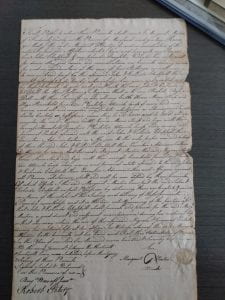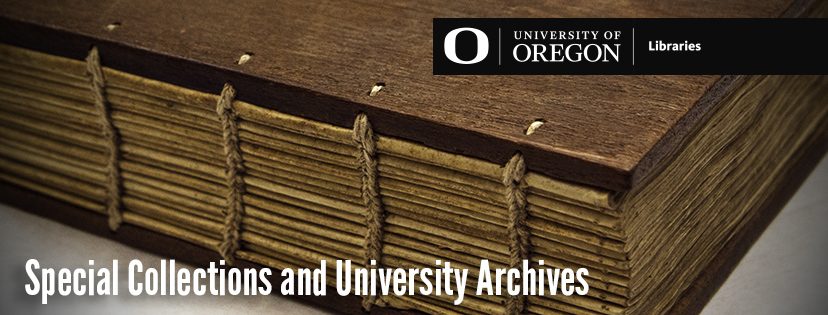New Acquisition: 1776 Manuscript Deed for Three Slaves
 University of Oregon Libraries Special Collections and University Archives recently acquired a 1776 manuscript deed for three slaves in Frederick County, Maryland. The history of Maryland portrays the inextricable tie between slavery, the economy and colonial politics. Tobacco, rice, coffee, and sugar plantations labored upon by slaves provided fodder for a budding economy, and the fortunes amassed from the plantation system and the exploitation of African Americans in other areas of labor funded political endeavors of individuals of the state of Maryland into positions of high prominence, respect, and power. Slavery in Maryland took significant hold during the 1660s when the opportunity to import indentured servants from Europe withered due to disagreements. Slavery and the slave trade, recently legalized in Maryland, presented to plantation owners the most viable and economic option in replacement of European indentured servants. Between the late 17th century and the Revolutionary War, the population of Maryland grew with the addition of over 100,000 African slaves. The constituency of Maryland reflected this substantial influx with over one third of their population being of African descent (The Maryland State Archives and the University of Maryland College Park, 2007).
University of Oregon Libraries Special Collections and University Archives recently acquired a 1776 manuscript deed for three slaves in Frederick County, Maryland. The history of Maryland portrays the inextricable tie between slavery, the economy and colonial politics. Tobacco, rice, coffee, and sugar plantations labored upon by slaves provided fodder for a budding economy, and the fortunes amassed from the plantation system and the exploitation of African Americans in other areas of labor funded political endeavors of individuals of the state of Maryland into positions of high prominence, respect, and power. Slavery in Maryland took significant hold during the 1660s when the opportunity to import indentured servants from Europe withered due to disagreements. Slavery and the slave trade, recently legalized in Maryland, presented to plantation owners the most viable and economic option in replacement of European indentured servants. Between the late 17th century and the Revolutionary War, the population of Maryland grew with the addition of over 100,000 African slaves. The constituency of Maryland reflected this substantial influx with over one third of their population being of African descent (The Maryland State Archives and the University of Maryland College Park, 2007).
With the American Revolution arose the opportunity for some African Americans to escape slavery by enlisting in the military as soldiers and as laborers. In 1775, the royal governor of Virginia, Lord Dunmore, enacted a decree freeing indentured servants and slaves. However, it would not be until the Civil War and President Abraham Lincoln’s Emancipation Proclamation that any momentous change would be set into motion in ending slavery in Maryland. President Abraham Lincoln excluded Maryland in his 1863 Emancipation Proclamation, though this did not contain the flowing tide of more and more slaves seeking freedom. The military served as one of the greatest blows to the barriers bolstering slavery in Maryland; thousands of slaves enlisted as soldiers, much to degree that the very infrastructure of slavery in Maryland began to crack. It was not until 1864 that Maryland officially ratified as state law the prohibition of slavery, a year later than President Lincoln’s seminal proclamation (The Maryland State Archives and the University of Maryland College Park, 2007).
 The 1776 manuscript deed for three slaves in Frederick County, Maryland, was decreed during the Revolutionary War era. While some slaves were able to join the military as soldiers and laborers, the plantation system still tethered African American slaves to a system of exploitation and violence. The manuscript deed for three slaves reflects the attitude toward African American slaves as merely chattel, property to be passed from white landowner to white landowner. In the manuscript deed, Rachel, Bess, and Doll are transferred as elements of an estate from Margaret Masters to her son John Chappell and his wife, Verlinda Chappell. Also transferred by deed alongside Rachel, Bess, and Doll were horses, sheep, cattle, hogs, furniture, and utensils. Robert Peters witnessed the signing and sealing of the deed on behalf of Margaret Masters.
The 1776 manuscript deed for three slaves in Frederick County, Maryland, was decreed during the Revolutionary War era. While some slaves were able to join the military as soldiers and laborers, the plantation system still tethered African American slaves to a system of exploitation and violence. The manuscript deed for three slaves reflects the attitude toward African American slaves as merely chattel, property to be passed from white landowner to white landowner. In the manuscript deed, Rachel, Bess, and Doll are transferred as elements of an estate from Margaret Masters to her son John Chappell and his wife, Verlinda Chappell. Also transferred by deed alongside Rachel, Bess, and Doll were horses, sheep, cattle, hogs, furniture, and utensils. Robert Peters witnessed the signing and sealing of the deed on behalf of Margaret Masters.
The first page of the manuscript deed provides an extensive statement by Margaret Masters and witnessed by Robert Peters. A second page provides a shorter statement, dated 16 November 1776, also witnessed by Robert Peters. The outside panel succinctly marks the names of those involved in the deed, the dates, and legal notation.
 This Deed adds to previous items recently acquired that document the history of slavery in the United States:
This Deed adds to previous items recently acquired that document the history of slavery in the United States:
Statement Attesting that a ‘Negro Woman’ is Free Born, Frederick County, MD, 1832
An Account of the Sales and the Real and Personal Estate of Henry Holeman Deceased
Pay Document to Black Connecticut Revolutionary War Soldier, Pomp Cyrus, 1782
Sources
The Maryland State Archives and the University of Maryland College Park. (2007). A guide to the history of slavery in Maryland. https://msa.maryland.gov/msa/intromsa/pdf/slavery_pamphlet.pdf
Written by Alexandra Mueller, Special Projects Archivist

